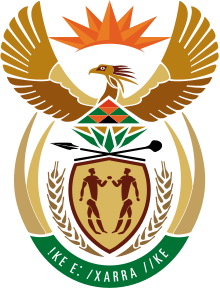- Civil Union Act, 2006
-
Civil Union Act, 2006 
Act to provide for the solemnisation of civil unions, by way of either a marriage or civil partnership; the legal consequences of civil unions; and to provide for matters incidental thereto. Citation Act No. 17 of 2006 Enacted by Parliament of South Africa Date enacted 28 November 2006 Date assented to 29 November 2006 Date commenced 30 November 2006 Legislation history Bill Civil Union Bill Bill citation B 26—2006 Bill published on 31 August 2006 Introduced by Nosiviwe Mapisa-Nqakula, Minister of Home Affairs First reading 12 September 2006 Second reading 14 November 2006 Related legislation Marriage Act, No. 25 of 1961 The Civil Union Act, 2006 (Act No. 17 of 2006) is a South African Act of Parliament which legalised same-sex marriage. It was enacted as Parliament's response to the judgment of the Constitutional Court in the case of Minister of Home Affairs v Fourie, which ruled that it was unconstitutional for the state to provide the benefits of marriage to opposite-sex couples while denying them to same-sex couples.
Contents
Legislative history
The Constitutional Court's judgment set a deadline of 1 December 2006 for Parliament to rectify the situation, failing which words would be "read in" to the Marriage Act to allow same-sex marriages to take place.
On 24 August 2006, the Cabinet approved the Civil Union Bill for submission to Parliament.[1] It was introduced in the National Assembly by the Minister of Home Affairs on 12 September. The original bill only allowed for civil parnerships between same-sex partners, and also included provisions to recognise domestic partnerships between unmarried partners, both same-sex and opposite-sex. The bill was amended in committee to allow both marriages and civil partnerships, and to open them to opposite-sex as well as same-sex couples.
The final vote in the National Assembly was held on 14 November. The ruling African National Congress called a three line whip, requiring its MPs to vote for the bill. Most opposition parties voted against it, while the Democratic Alliance allowed its MPs a conscience vote. The bill passed by 230 votes to 41 with two abstentions.[2] The National Council of Provinces passed it on 28 November by 36 votes to 11 with one abstention. It was signed on 29 November by Deputy President Phumzile Mlambo-Ngcuka (acting for President Thabo Mbeki) and came into force the following day.[3]
Provisions
A civil union may be contracted under the act by a same-sex or opposite-sex couple, and they may choose to form it either as a marriage or as a civil partnership. Whichever name is chosen, the legal consequences of a civil union are the same as those of a marriage under the Marriage Act. Any reference to marriage in any law is deemed to include a civil union, and any reference to a husband, wife or spouse is deemed to include a spouse or partner in a civil union.
A person may not contract a marriage or civil partnership if he or she is already married (or civilly partnered) under the Civil Union Act, the Marriage Act, or the Recognition of Customary Marriages Act. Both partners must be 18 or older and mentally competent. The same prohibited degrees of consanguinuity and affinity apply as would apply under the Marriage Act.
A marriage or civil partnership must be solemnized by a marriage officer in the presence of the partners and two witnesses. The solemnization may occur in a public office, a private house, or in premises used for the purpose by the marriage officer. The marriage officer asks each partner:
"Do you, A.B., declare that as far as you know there is no lawful impediment to your proposed marriage [or civil partnership] with C.D. here present, and that you call all here present to witness that you take C.D. as your lawful spouse [or civil partner]?"and when each partner has responded in the affirmative, he or she solemnizes the marriage by saying:
"I declare that A.B. and C.D. here present have been lawfully joined in a marriage [or civil partnership]."Secular marriage officers under the Marriage Act — magistrates and Home Affairs officials — are automatically marriage officers for the purposes of the Civil Union Act. They may apply to the Minister of Home Affairs to be exempted from performing same-sex marriages on the grounds of conscience, religion or belief. Marriage officers who are ministers of religion are not marriage officers for the purposes of the Civil Union Act unless both they and their denomination apply to be designated as such. Marriage officers have the same powers, responsibilities and duties under the Civil Union Act as they do under the Marriage Act.
References
- ^ Quintal, Angela (25 August 2006). "Same-sex marriages bill tabled in parliament". Independent Online. http://www.iol.co.za/news/politics/same-sex-marriages-bill-tabled-in-parliament-1.290971. Retrieved 6 July 2011.
- ^ "S Africa approves same-sex unions". BBC News. 14 November 2006. http://news.bbc.co.uk/2/hi/africa/6147010.stm. Retrieved 13 July 2011.
- ^ "SA same-sex marriage law signed". BBC News. 30 November 2006. http://news.bbc.co.uk/2/hi/africa/6159991.stm. Retrieved 13 July 2011.
External links
 Lesbian, gay, bisexual, transgender topics in South Africa
Lesbian, gay, bisexual, transgender topics in South Africa 
Law LegislationSection 9 of the Constitution • Promotion of Equality and Prevention of Unfair Discrimination Act • Alteration of Sex Description and Sex Status Act • Civil Union Act • Criminal Law (Sexual Offences and Related Matters) Amendment ActCase lawNCGLE v Minister of Justice • NCGLE v Minister of Home Affairs • Satchwell v President • Du Toit v Minister of Welfare • J v Director General, Home Affairs • Minister of Home Affairs v Fourie • Geldenhuys v NDPP
People Organisations Community centres Durban Gay & Lesbian Community & Health CentreCulture Gayle language · IsiNgqumoEvents Cape Town Pride • Johannesburg Pride • Mother City Queer Costume Party • Pink Loerie Mardi GrasMedia Behind the Mask • Wrapped (magazine)Issues Other LGBT tourism in South AfricaCategory:LGBT in South Africa Categories:- South African legislation
- 2006 in LGBT history
- 2006 in South Africa
- 2006 in law
- LGBT law in South Africa
- Marriage, unions and partnerships in South Africa
- South African family law
Wikimedia Foundation. 2010.
